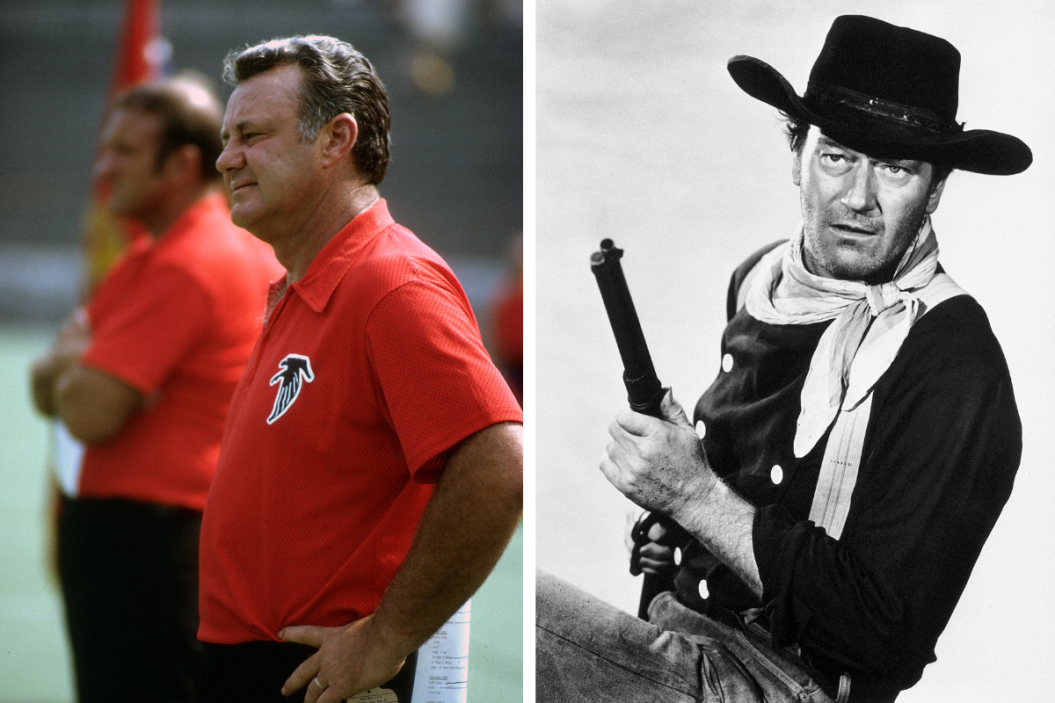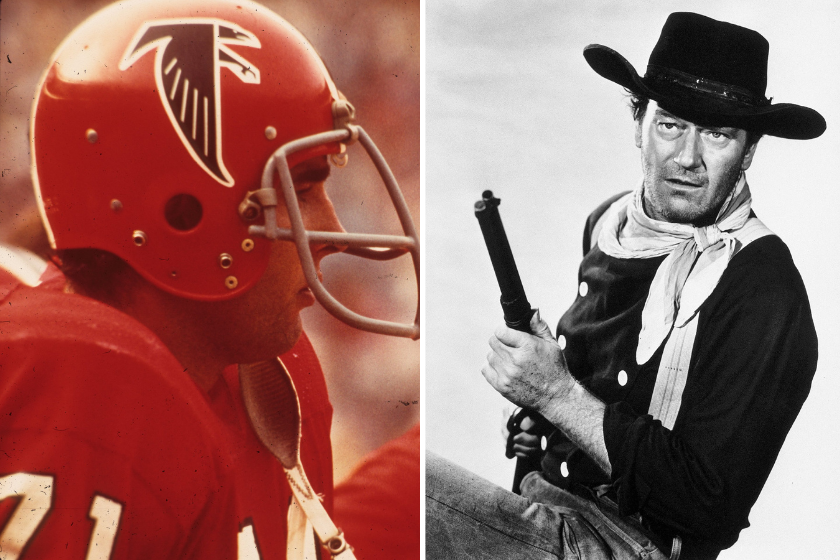The NFL Draft is full of turns, twists and surprises at every pick. You never know when a team will pull off a blockbuster deal or if it will pick its next cornerstone impact player.
Videos by FanBuzz
Every year there's also always at least one wild draft story. The 2016 version featured a video of offensive lineman Laremy Tunsil smoking weed out of a gas mask. In 2014, the world watched and waited for the selection Johnny Manziel, a process he sped up when he texted the Cleveland Browns quarterback coach.
One of the wilder ones — as wild as the wild, Wild West — was the one that took place in 1972 NFL Draft.
Falcons Select John Wayne, Pick is Vetoed
https://twitter.com/1970snfl/status/1097930805219860481?s=11
The Atlanta Falcons were on the clock, tasked with making their 17th-round pick. Back then, the draft consisted of 17 rounds. It's been shortened throughout the years and has stayed at seven rounds since 1994.
Falcons coach Norm Van Brocklin stood up and yelled to his staff: "Do we want the roughest, toughest S.O.B. in the draft?!" The answer, of course, was a resounding yes. Van Brocklin then phoned into NFL's headquarters and said, "Atlanta picks John Wayne of Fort Apache State."
The 64-year-old Wayne had starred in hundreds of motion pictures, and Fort Apache (1948) was one the 142 flicks "Duke" starred in during his illustrious acting career.
NFL commissioner Pete Rozelle vetoed the pick, however.
Wayne did at least have a football background. Born as Marion Robert Morrison in Winterset, Iowa, Wayne played at Glendale High School in Glendale, California, and earned a scholarship to play offensive tackle for the University of Southern California Trojans in Los Angeles under head football coach Howard Jones in the 1920s. He and a few teammates on the football team also began working at Fox Film Corps as stuntmen and extras while playing.
The 6-foot-4 Wayne hung up the cleats at USC when he broke his collarbone while bodysurfing his junior year, ending his college football career. He had to leave school when he lost his football scholarship, a move that ultimately paid off big time for the Oscar winner.
From Football to Hollywood
#TBT to the days of when #TheDuke was a college football player ✌🏼 John Wayne also was a Sigma Chi during his time at USC pic.twitter.com/q8nL2tj5Tu
— John Wayne Official (@JohnDukeWayne) February 8, 2018
RELATED: The 5 Tallest NBA Players Who Became Larger-Than-Life Movie Stars
Director John Ford gave Wayne his shot on screen as a favor to Jones, who had given USC tickets to an actor of his. Wayne first began working as a prop man for Fox Studios in 1927 and went by "Duke Morrison" early in his career.
Wayne played in small parts until earning his first lead starring role in Raoul Walsh's The Big Trail (1930) and became a mainstream star after Ford's Stagecoach (1939). It wasn't until 30 years later he'd win his first Academy Award for Best Actor as a one-eyed marshal in True Grit (1969).
He'd go on to star in plenty more films and box office hits in the United States, including Sands of Iwo Jima (1949), She Wore a Yellow Ribbon (1949), The Quiet Man (1952), The Searchers (1956), The Man Who Shot Liberty Valance (1962) and The Shootist (1976). He also directed two films: The Alamo (1960) and The Green Berets (1968).
Wayne wasn't the only Hollywood movie star to ever hear his name called on draft day, nor is he the only actor to once excel as a football player.
Burt Reynolds played halfback for Florida State in the 1950s and is in the school's athletic hall of fame. Terry Crews — AKA the jacked Old Spice commercial dude — played defensive end at Western Michigan and became an 11th-round draft pick in 1991.
John Goodman, best known for his role on Roseanne, played for Southwest Missouri State in the 1970s but quit the sport following an injury. Even Phil McGraw, better known as Dr. Phil, played linebacker for Tulsa in 1968.
The Duke was diagnosed with lung cancer in 1964 and died of stomach cancer in 1979 at the UCLA Medical Center. He received a Congressional Gold Medal shortly before his death and was awarded the Presidential Medal of Freedom in 1980.
Marion Morrison may have never played in the NFL, and the Falcons' draft selection wasn't meant to be serious even though he did play for USC football, but the American icon and film star did pretty well for himself and proved he was a certified badass on screen.
This article was originally published on August 27, 2019.

